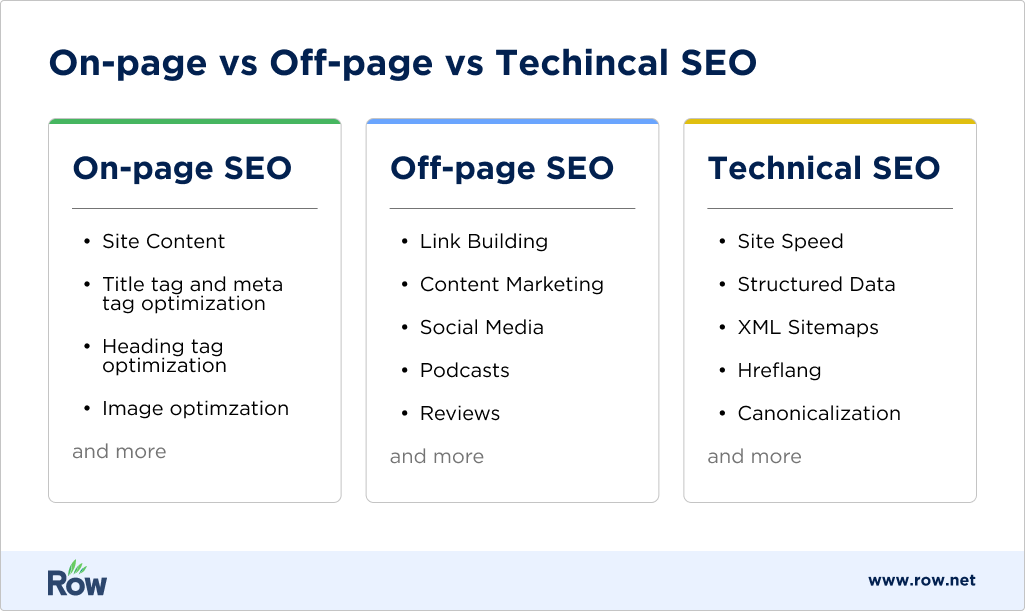On-page vs Off-page vs Technical SEO
In the world of SEO, there are a lot of terms that get thrown around. Whether you're just starting out or looking to brush up on your knowledge, it can be hard to keep track of them all. We've got you covered! In this guide, we'll explain what on-page and off-page SEO are and how they differ from technical SEO.
Written by: Row Business Solutions

On-page SEO
On-page SEO is about optimizing the content and structure of your website. Keyword research, writing compelling copy that engages users, developing a unique selling proposition (USP), and writing high-quality blog posts are all part of on-page SEO.
In addition to optimizing your existing content for search engines, you can create new pages—like landing pages or blog archives—to optimize specific keywords or target audiences. For example, suppose you have an eCommerce store that sells baby clothing. In that case, you might want to create a page specifically for parents with infants who are first-time parents (or perhaps even more specifically just expectant mothers). This gives potential customers another way to find you without relying on Google's general search results alone.
Off-page SEO
Inbound links are links from other websites to yours. The best way to get inbound links is by creating content that's worth linking to. This means focusing on quality over quantity, and writing about topics that people will want to share with others.
Social media is another off-page tactic that can help drive traffic and boost your rankings, as long as you take the time to manage it well. It's also important to build relationships with other industry influencers so they'll link back to you when they talk about related topics online (more on this later).
Press coverage and media mentions are also off-page SEO tactics that help put your brand on the map! If someone writes an article or records a video talking about something relevant to your business (like how great it is), then that could lead more people looking for information about what they discussed directly back onto your website—or even better yet: onto one of its pages where they'll see all kinds of cool stuff about what makes up being part of your business.
Technical SEO
Technical SEO is a term for the process of making sure your website is technically optimized to rank well. This includes things like making sure your website loads quickly and its pages are mobile-friendly, as well as the more technical aspects like making sure its code structure is sound.
Technical SEO isn't just about how fast or slow a site loads; it's also about how secure a site is from hackers, who could use vulnerabilities in websites to gain access to user information, such as passwords and credit card data.
These three aspects of SEO are all different and need to be considered when optimizing your website
As a website owner, you want to rank well in search engines. That's your primary goal when optimizing a website. The good news is that there are three different ways to optimize your website: on-page SEO, off-page SEO, and technical SEO.
On-page SEO consists of everything that happens on your website— from the moment someone lands on it until they leave (or close their browser). This includes making sure duplicate titles and descriptions aren't being used for multiple pages; ensuring that URLs are short but descriptive; making sure each piece of content has an alt attribute if it contains images (even if those images don't appear); looking over meta tags for accuracy; checking for broken links; checking for broken internal links; ensuring internal anchors are working properly; making sure metadata is accurate and comprehensive…and so much more! It's critical stuff!
Off-page SEO refers to external factors such as backlinks pointing back at your page or site (from other sites), social signals (likes/retweets/shares), mentions/mentions in tweets by Twitter accounts with large followings...and so much more! Additionally important: domain authority (DAM) which measures how valuable a keyword phrase would be if it were branded with the domain name being measured."
Conclusion
We hope you found this article helpful. As you can see, there are many aspects of SEO that need to be considered when optimizing your website. While technical SEO is an important component of the process, it’s not something that should be left up to someone else—it’s something you should learn about and stay on top of as a marketer or webmaster. After all, your site won’t rank well if it doesn’t have any links pointing toward it!





